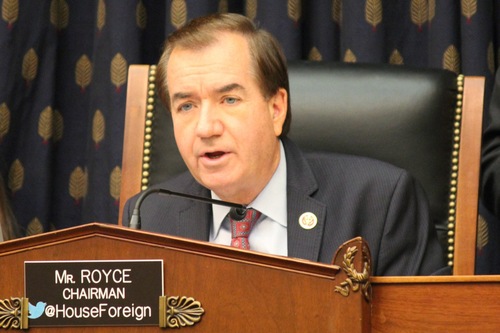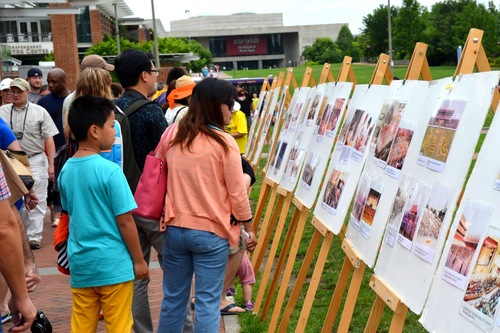(Minghui.org) With unanimous support, the U.S. House Committee on Foreign Affairs recently endorsed a house resolution condemning systematic, state-sanctioned forced organ harvesting in China.
Co-sponsored by 199 congressional representatives from both sides of the aisle, the resolution H. Res. 281 now awaits scheduling for a general vote before it becomes an official resolution. Tens of thousands of American voters support the resolution.
The resolution was proposed by Republican Rep. Ileana Ros-Lehtinen (Florida) and former Democrat Rep. Robert Andrews (New Jersey).
H. Res 281 “calls on China (PRC) to end the practice of organ harvesting from prisoners, and particularly from Falun Gong prisoners of conscience and members of other religious and ethnic minority groups.”
The resolution “calls for a Department of State investigation into organ transplant practices in China, and for the prosecution of those found to have engaged in such practices” and “demands an end to the persecution of the Falun Gong spiritual practice by the Communist Party of China and the release of all Falun Gong practitioners and other prisoners of conscience.”
 Edward Royce, the chair of the House Foreign Affairs Committee
Edward Royce, the chair of the House Foreign Affairs Committee
At the opening statement of the committee markup meeting on July 30, Edward Royce, chair of the House Committee onForeign Affairs, said that besides condemning organ harvesting and calling for an independent and transparent investigation on this issue, the resolution also encourages the State Department to include greater detail of forced organ harvesting in its reports, and encourages medical professionals to educate their patients about the dangers of transplant tourism.
 Republican Congresswoman Ileana Ros-Lehtinen (FL)
Republican Congresswoman Ileana Ros-Lehtinen (FL)
Congresswoman Ros-Lehtinen pointed out that the Falun Gong is a peaceful group, but has been persecuted because of their beliefs. She believed that the resolution shows a strong support to the persecuted religious groups. She also hopes that it will help raise public awareness of the forced organ harvesting in China.
 Congressman Christopher Smith of New Jersey, a senior member on the Committee on Foreign Affairs, and the co-chair of the Congressional-Executive Commission on China
Congressman Christopher Smith of New Jersey, a senior member on the Committee on Foreign Affairs, and the co-chair of the Congressional-Executive Commission on China
Republican Congressman Christopher Smith, one of the co-sponsors of the resolution, quoted the testimony of a former Chinese policeman, which stated that the Chinese prisons harvest organs at high prices based on transplant demand, and Falun Gong practitioners are a major target in the crimes of organ harvesting.
Public Support for an End to Organ Harvesting
The resolution has received wide support from the American public.
Over 10,000 people in southern California alone have signed a petition urging their congressmen to co-sponsor the resolution.
On July 4, at the 4th of July celebration in Bainbridge Island, Washington, 260 citizens signed the petition to support H. Res. 281. Many people thanked Falun Gong practitioners for raising the awareness of the important issue of organ harvesting in China.
 A scene at a signature drive in Rochester, NY
A scene at a signature drive in Rochester, NY
On July 19, Falun Gong practitioners held a series of activities in Philadelphia's Independence National Historical Park. Locals and tourists voiced their strong support for practitioners' peaceful resistance to the brutal persecution, including forced organ harvesting.
 Practitioners' display informational boards in front of the Liberty Bell in Philadelphia, Pennsylvania
Practitioners' display informational boards in front of the Liberty Bell in Philadelphia, Pennsylvania
 In front of the Liberty Bell, Jenn Foreacre urges her congress representative to support H. Res. 281.
In front of the Liberty Bell, Jenn Foreacre urges her congress representative to support H. Res. 281.
 In front of the Liberty Bell, Elizabeth Prendergast from Virginia signs on the petition to support H. Res. 281.
In front of the Liberty Bell, Elizabeth Prendergast from Virginia signs on the petition to support H. Res. 281.
A signature drive at the Orange County Fair in Middletown, NY from July 17 to 27 received strong support as well. Many people expressed that they would spread the words about the Resolution to their families and friends.
In Michigan, signature drives have been held at libraries, farmers markets, July 4th celebrations, Chinese supermarkets, museums, and cultural festivals.
 Signature drive at the Fireworks Festival in Plymouth, Michigan.
Signature drive at the Fireworks Festival in Plymouth, Michigan.
 Signature drive on the campus of University of Michigan, Ann Arbor
Signature drive on the campus of University of Michigan, Ann Arbor
A gentleman on the campus of University of Michigan wondered if the resolution would help and asked a practitioner what would happen if the communist party ignored the public voice.
The practitioner said: “The Chinese regime fears exposure. When the whole world knows about organ harvesting, they will not dare to continue. Your signature will help to raise awareness.”
The gentleman agreed, signed the petition to support H. Res. 281, and thanked practitioners for their efforts.





